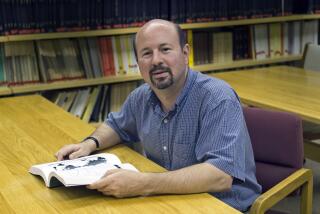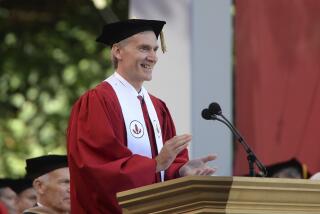Vast Majority of Dedicated Scientists Should Not Suffer Because of a Few Grandstanders
- Share via
In his article (Why Beauty of Scientific Models Is Often Only Skin Deep, Dec. 21), Michael Schrage has concocted a convoluted diatribe dealing with the raising of funds for scientific research, the process of doing science (i.e., generating scientific models) and the reporting of the results of these models.
In effect, he appears to put forth the thesis that scientists, in general, have entered into an era of abusing the scientific process and misrepresenting the results of their work to the public in order to garner research funding. This is an undeserved vilification of a scientific community which not only is faced with increasingly difficult problems to solve (and thus more costly research), but also is the envy of the rest of the world.
While there have always been a handful of “grandstanders” in science, as elsewhere in society, who are willing to put principles aside for personal gain (and who occasionally succeed), the vast majority of the scientific community is sincere in its efforts to do good science and to place scientific results in the proper perspective. The vast majority of scientific programs involving significant levels of funding have had to pass through an arduous process of peer evaluation and stiff competition. They represent the best capabilities of modern science.
Perhaps most telling of Schrage’s lack of understanding of the scientific process is his comment that “too many scientists have fallen in love with their models.” What a feeble attempt at mockery! Mr. Schrage, a scientist who has not fallen in love with his model is no better than a writer who has not fallen in love with his story--he is not worth wasting money on. A good scientist must be able to champion his work, because if he can’t, who can? Does advocacy or love translate into sleaziness or a lack of rigor as you suggest? I hardly think so! But it is clear that you are confused, inasmuch as you also appear to be relating sleaziness to sexiness.
Now Mr. Schrage, since you’ve chosen to pick on earthquake prediction, let me ask when have you spoken to a credible earthquake scientist about earthquake prediction? When have you heard one ask Congress for funding? Why don’t you give us some examples, some names or organizations? Is it because you have no examples of sleaziness--only examples of scientists extolling the virtues of certain forms of earthquake prediction or, more appropriately, earthquake forecasting, while at the same time providing an honest assessment of the limitations imposed by the current level of understanding of the earthquake process? I think this must be the case, and that you have a vivid imagination.
THOMAS L. HENYEY
Los Angeles
The writer is professor and chairman of the Department of Geological Sciences at USC.






